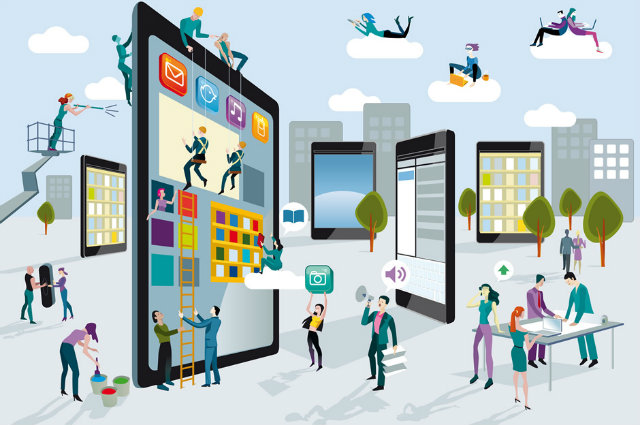
Two years ago Gartner predicted that marketers will spend more than IT on technology innovation by 2017. As we get closer to the day of that prophecy, is the shift really happening?
While we won’t face a transfer of power from CIOs to CMOs very soon, there is no doubt that marketing and technology are now more connected than ever. So strictly linked, in fact, that digital marketing strategy is not even conceivable without disruptive technologies.
Let’s start with numbers: today just about 50 per cent of tech spending outside of the IT department comes from marketing budget. According to Gartner, this value will grow till an abundant 80 per cent in the next three years.
The reason is evident: with customers’ lives so dependent on digital screen and mobile devices, marketers are increasingly relying on technology to drive better results. In the Age of the Customer, where information is readily available, companies strive to build engagement across all touch points of the digital marketing funnel.
In the last decade, the way we live and communicate has deeply changed, and so the way we make purchases:
-
Traditional retail is challenged by the power of e-commerce firms and worldwide competition.
-
The in-store retail experience is shaped and guided by smart objects and devices.
- Cash and credit cards go side by side with mobile payment methods (Apple Pay).
In a world gone mobile, brands must think and act digital first. There is no other way to connect with empowered customers, whose life rhythm is marked by smartphones, wearables and all sorts of mobile devices. This is the essence of digital customer experience.
For your company, technology is no longer something that just drives business' infrastructure; it is a driving force behind acquisition, marketing strategy, engagement and loyalty. In this perspective, technology is expected to be part of the fabric of your brand identity. The page you write your story on.
The correlation between marketing and technology is more than just statistics and analytics. From online inbound activities to traditional awareness and attraction tactics, all things marketing are now made more effective by digital tools:
-
SEO and content management tools;
-
Social media and community platforms;
-
Web analytics and tracking dashboards;
-
Big Data analysis and all Cloud features;
-
Online and mobile advertising;
-
E-commerce platforms;
-
Email marketing, coupons and leaflets.
The keyword to understand why you need to improve your digital marketing strategy is ‘customer experience’.
“In many industries, hypercompetition has eroded traditional product and service advantages, making customer experience the new competitive battlefield.”
To stay with Gartner, one of their most cited predictions is that customer experience will be the primary basis of competition among brands by 2016. The improvement of the customer journey becomes priority and, while the entire organization should be aligned around customer-centricity, marketers are directly involved in the management of the experience.
Traditional - analog, we would say - patterns are not capable to ensure that your efforts will reach the long-awaited results. The ever-changing scenario of digital transformation demands new strategies, and new strategies require disruptive technologies.
What can we expect in the next few years? Here are 3 major trends already rewriting the way brands plan and deliver their digital marketing strategies.
THE CUSTOMER EXPERIENCE COMES FIRST
If all organizations will really compete primarily on the battlefield of customer experience, it is pretty clear where marketers will put great part of their budget spent in technology. The aim is to attract, convert and delight customers; if success is driven by the ability to exceed customer expectations, marketing and technology need to realign to provide a great customer journey, wherever they are and whatever channel they are using.
THE INTERNET OF THINGS IS MARKETING
If there is an industry feeling the pressure of digital challenge, that is consumer products, retail and distribution. The idea of store and physical location is on the turn, and every single invention could change retail customer experience forever: e-commerce, branded apps, iBeacon, push notifications, Apple Watch and mobile payments. The Internet of Things is the next frontier of the marketing reinvention, and innovative engagement will pass through the intercommunication of connected objects.
MARKETING BECOMES PEOPLE-BASED
Customer obsessed companies plan and execute their marketing starting from people, not brand. Marketing is not for products but for customers. Content personalization is the key if you want to be perceived as innovative and exclusive - especially in the fashion and luxury industry. Technology will help marketers to collect data and connect with clients: gamification dynamics, context aware contents, virtual and augmented reality, personalized offers.
Linking marketing and technology is not an end in itself. To increase sales and deliver business results, you will need to put all pieces together and ultimately create an amazing, innovative and delightful digital customer experience, across all channels and devices.
YOU MIGHT ALSO LIKE: Virtual Reality To Improve Customer Customer Experience: 4 Real World Examples
To help you ensure a strategic advantage to your organization, learn about the DCX 7-Steps Checklist crafted by Neosperience, with requirements and insights for a successful digital transformation.



 Your magnifing glass to deeply understand your users and increase the value of each relatonship.
Your magnifing glass to deeply understand your users and increase the value of each relatonship. Listen to the voice of your customers deeply to understand what they truly want.
Listen to the voice of your customers deeply to understand what they truly want. The Lead Generation Platform to get leads from anonymous traffic on your website.
The Lead Generation Platform to get leads from anonymous traffic on your website.  Understand the behavior of people in physical spaces and monitor safety requirements.
Understand the behavior of people in physical spaces and monitor safety requirements. The Digital Commerce Platform designed to follow the most modern technological standards..
The Digital Commerce Platform designed to follow the most modern technological standards.. The XReality platform to tell brand and product stories by connecting physical and digital worlds.
The XReality platform to tell brand and product stories by connecting physical and digital worlds. Points, rewards, levels, badges, missions: a world of nudges to nurture your customer community.
Points, rewards, levels, badges, missions: a world of nudges to nurture your customer community. Discover all the other solutions!
Discover all the other solutions!









